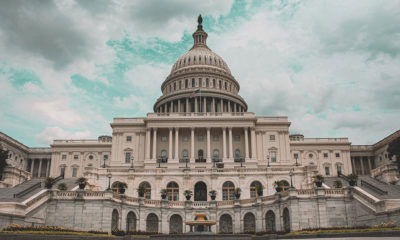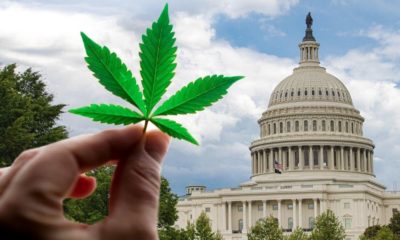
Politics
What Happens When Congress’s Medical Marijuana Protections Expire?
Spoiler: Nothing. The U.S. federal government is scheduled to shut down again later this month, which means another round of worrying over expired protections for state-legal medical marijuana. But don’t worry — this has happened before.
On March 23, the federal government is scheduled to run out of money. Unless Congress passes yet another temporary spending bill by that time, non-essential government functions will cease. Certain provisions attached to the annual spending bill will expire. Fingers will point, but business in Washington will continue on mostly as usual, as it will wherever cannabis is legally bought or sold.
Once considered a political tool of last resort, government shutdowns have now become almost routine. Temporary spending bills expired in January and in February. If Congress can’t square a deal away in the next two weeks, this latest shutdown will feel like nothing so much as a standard clock’s ticking.
Packaged along with that rhythm will be some worrying and speculating about the Justice Department and state-legal medical marijuana.
If Congress fails to pass a temporary spending bill, key protections guarding state-legal medical marijuana from federal Justice Department enforcement — the Rohrabacher-Blumenauer amendment, named for its Congressional sponsors — will expire.
The Justice Department, including its prosecutors and police, is exempted from furlough. Thus, if the government grinds to a semi-halt, federal agents will find themselves empowered with new leeway to conduct raids and file charges against medical-marijuana providers in more than two dozen states.
By now, the pattern should be obvious. Yes, the federal government will have the theoretical authority to stage a nationwide medical-marijuana crackdown if the Rohrabacher-Blumenauer amendment is allowed to expire.
But all indications point to the fact that the Justice Department won’t suddenly act — either because it can’t or because it has other priorities.
Cannabis programs just launched in Texas and Arkansas. These are two deep-red states. Weed appears to be a winner here, as it is almost everywhere else. A medical-marijuana crackdown would prove vastly unpopular with voters — the same voters who will be asked to keep Republicans in Congress in the midterm elections later this year. Starting an unpopular domestic war is not what GOP members of Congress want.
Lost in the worry over the expiration of the Rohrabacher-Blumenauer amendment is another key point: If U.S. Attorney General Jeff Sessions were to crack down on states with adult-use marijuana, he doesn’t need to wait for Congressional protections to expire to do it, because the Rohrabacher-Blumenauer amendment only applies to medical cannabis.
Commercial adult-use marijuana industries have launched now in six states: Colorado, Washington, Oregon, Alaska, Nevada and California. It wouldn’t take much effort to find an operation whose compliance with state law is questionable. It takes a quick visit to Weedmaps to find a list of people violating federal law. California has gone as far as to send Weedmaps a cease-and-desist letter, telling the company that it must stop giving advertising space to non-compliant cannabis businesses.
This was true when Sessions was sworn in, it was true the last time the Justice Department had its supposed handcuffs taken off in February and it will be true on March 24, whether or not the government shuts down. It’s been more than a year of Sessions at the helm of the DOJ and the rhetoric on cannabis has yet to escalate into action.
TELL US, are you worried about the Rohrabacher-Blumenauer amendment expiring?
























